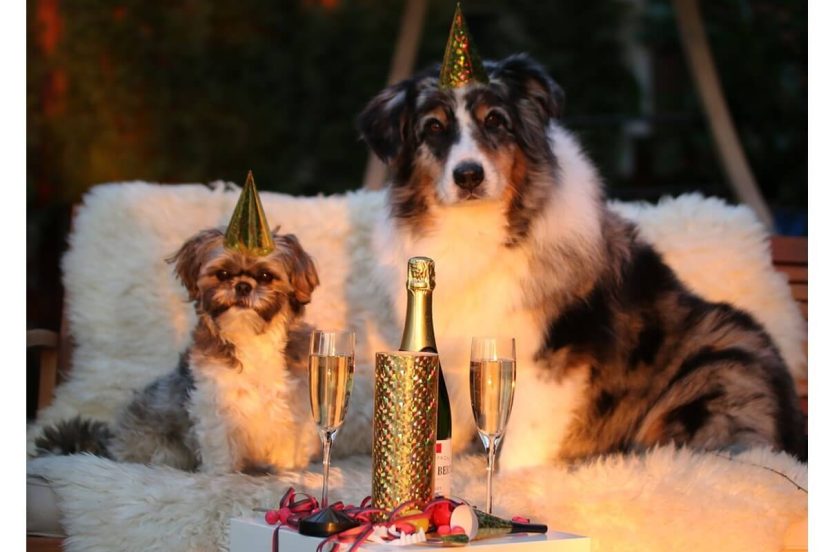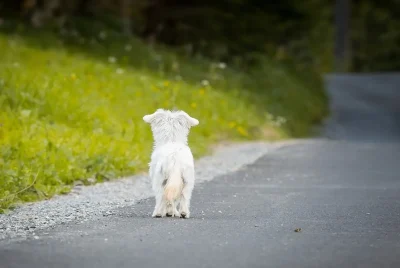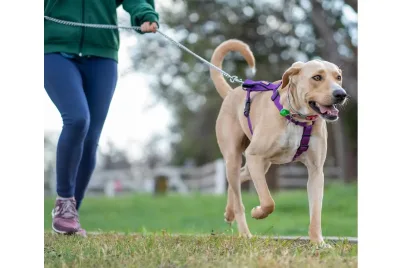Happy New Year Dog: Safety Tips for Celebrating
There’s still one more holiday we’re counting down the days to, so before you break out the noisemakers and champagne, let’s prepare for fun and safe Happy New Year dog celebrations with these safety tips. New Years celebrations can be a blast for us – but it can be a frightening, overwhelming experience for dogs.
As the year comes to an end, there are celebrations with hopes for a better new year ahead. Check out these beneficial pointers aimed at safeguarding and ensuring the happiness of our four-legged family members during the festivities. Here are 5 tips to safely enjoy the New Year’s festivities with your furry friend for a happy new year dog.
Is New Year’s risky for our beloved dogs?
You might assume New Year’s Eve is just an ordinary day for your furry companions, but it’s worth reconsidering. According to the German animal welfare organization TASSO, New Year’s Eve stands out as the day when more pets tend to go missing compared to any other day in the year. In the United States, the only day that rivals this statistic is the Fourth of July.
The vibrant display of fireworks, along with lots of chaos, noise and music, can become an overwhelming and frightening ordeal for our beloved dogs. It’s no wonder they tend to bolt away or seek refuge. Their natural instinct drives them to find safety in such scenarios.
5 Safety Tips for a Happy New Year Dog
1. Enjoy lots of tiring exercise together
On the morning of December 31st, give your dog an extended walk or engage them in some energetic playtime. Why? It’s straightforward—because a tired dog is a happy dog and more likely to take it easy on New Year’s Eve. (And less likely to wander away.)
Prioritize physical and mental exercises for your dog on New Year’s and the days preceding it, especially if your pooch will be home alone while you’re out celebrating. Try a mix of engaging activities like new games, enrichment toys, leisurely strolls, and more.
2. Keep your furry friends away from harmful substances.
Candy, alcohol, cigarettes—there’s a whole list of things that can be hazardous or harmful for dogs. This New Year’s, steer clear of substances like:
- Alcohol
- Chocolate
- Cigarettes, drugs, including secondhand marijuana smoke²
- Chemicals
- Toxic houseplants
- Salty snacks
- Meat with bones
Many human foods, harmless to us and even healthy, can be fatally toxic to our pets. For example, onions, mushrooms, garlic, and chocolate.
Educate your guests, especially kids, about foods that are off-limits for dogs.
Ensure your dog stays away from alcohol, human food, or drugs. Alcohol consumption in dogs can lead to lethargy, vomiting, walking difficulties, and even drops in blood pressure and body temperature.
Fatty foods like cheese, sausages, fried stuff, and deli meats can trigger pancreatitis, a painful condition that can quickly worsen.
While most dog parents know about the risks of chocolate, watch out for products with the sweetener xylitol, which can cause low blood sugar and liver failure in dogs. Even a small amount can be fatal.
Watch Out for Alcohol (and Other Substances)
Alcohol is a big no-no for our dogs—it causes vomiting, diarrhea, and neurological problems. Never give your pets alcohol.
New Year’s tends to see more pets exposed to alcohol. Even small amounts can cause depression, unsteadiness, vomiting, and in severe cases, a drastic drop in blood pressure and body temperature. Just a single mixed drink can be deadly for a small dog. Plus dogs, may sniff out seasonal chocolates laced with alcohol—so keep all alcoholic stuff out of their reach.
Also, as marijuana gets legalized in more places, the Animal Poison Control Center has noted more cases of pets ingesting it. Marijuana-infused edibles, like chocolates or brownies, are becoming popular—and curious dogs might find these off-limit treats. Marijuana can make your dog drowsy, unsteady, and sensitive to touch, reducing their heart rate and body temperature. In rare instances, seizures or death may occur. If you suspect your dog has ingested marijuana, contact a vet or the APCC (888) 426-4435 right away, and always store marijuana products safely away from your dog.
3. Create a safe space for your pets indoors.
As a general rule, try and keep your pets indoors. (Or at the very most, your secure backyard.) If you’re having guests over on New Year’s, think ahead and dedicate a room or a confined space for your dog.
To ensure your furry friend feels comfortable and secure and is a happy new year dog, create a designated quiet space for them. This could be their bed or crate, set up in a peaceful corner of your home. Equipped with some familiar toys and a cozy blanket, this space becomes their sanctuary, offering a sense of security when the celebration becomes too chaotic.
Dogs can hear four times as well as humans. So fireworks, firecrackers, loud music, conversations, and the like may cause extreme stress in your furry friend. Having a quiet safe space, away from the party or fireworks can be their refuge. Your dog would thank you for it – if they could.
By providing your dog with this haven, you not only protect them from potential stress but also promote a harmonious atmosphere for your guests. When your dog has a retreat to call their own, they can take breaks and recharge as needed, reducing the likelihood of them feeling overwhelmed or anxious. Remember, a little consideration for your furry friend can go a long way in ensuring a happy and stress-free holiday for everyone.
Some animals may benefit from one of the following to help lessen the intensity of voices and fireworks:
Anxious dogs may benefit from calming chews or require prescription medication to lessen their anxiety surrounding noisy gatherings and fireworks. Talk with your veterinarian if you believe a calming medication might be helpful for your fearful or anxious furry family member.
4. Importance of Routines for sleep, food and water
Ensuring a consistent routine for your furry friend, especially during festivities like New Year’s, is vital for their well-being. Dogs thrive on routine and familiarity, and sudden disruptions might lead to stress or anxiety. Consider your pet’s regular feeding and sleeping schedule as their lifeline amidst the chaos of celebrations. Maintain their feeding times, ensuring it aligns closely with their usual routine. Keeping this consistency helps them feel secure and minimizes the chance of them feeling distressed or attempting to escape due to anxiety.
Additionally, incorporating playtime or activities they enjoy is key to tiring them out before the festivities. A well-exercised pet tends to be more relaxed, reducing the likelihood of restlessness or nervousness during loud celebrations. Imagine it as preparing them for a calm night amidst the ruckus – a well-fed, happily tired doggie is more likely to curl up contentedly rather than feeling the need to escape from the commotion. By sticking to these familiar patterns, you provide a comforting and safe environment for your four-legged family member, allowing them to navigate the holiday bustle with a sense of security and ease.
5. Confirm your pooch is clearly tagged – just in case….
During the hustle and bustle of New Year’s, the unexpected can happen…..your furry friend might feel overwhelmed by the noise or festivities. Even well-trained dogs can become startled and dart out of open doors in search of safety. That’s where identification plays a pivotal role in ensuring your dog’s safe return home. Beyond the jingle of a collar, an ID tag equipped with clear contact information is a lifesaver.
Moreover, microchipping remains an invaluable safeguard for dogs. If your furry companion isn’t already microchipped, consider visiting your vet to get it done. If your dog already has a microchip, take a moment to verify and update your contact information associated with the chip. This tiny device, about the size of a grain of rice, is implanted under the skin and provides a permanent means of identification. Even if the collar or ID tag is lost, a microchip significantly enhances the chances of reuniting with your pooch. Think of it as an added layer of protection – a fail-safe that significantly increases the likelihood of your four-legged friend finding their way back home if they happen to wander off during the commotion of New Year’s celebrations.
Conclusion
As the countdown to a New Year begins and the anticipation of celebration fills the air, let’s not forget to prioritize the safety and well-being of our furry companions during this lively time. Amidst the festivity, dogs can find New Year’s overwhelming and scary, often leading to a spike in lost pets during this period. The vivid displays of fireworks and the hustle-bustle can trigger fear in our beloved dogs, urging them to seek refuge or bolt away, emphasizing the need for caution.
By implementing key strategies and adopting a thoughtful approach, we can ensure our dogs feel secure and content during the celebrations. These safety tips aim to protect our four-legged friends while allowing everyone to revel in the festivities. Ranging from engaging exercises and careful attention to their routine to safeguarding them from harmful substances, these insights pave the way for a joyous yet stress-free New Year for both humans and their canine companions.
Remember, by preparing a quiet, secure space for your dog, adhering to their routine, and ensuring they have proper identification, we pave the path for a safe and pleasant experience. As we step into a New Year, let’s celebrate responsibly, ensuring our furry friends feel safe, loved, and part of the joyous occasion. Cheers to a Happy New Year dog and secure comforting celebrations for all!
Happy New Year Dog FAQs
Q1: Can I give my dog a little bit of alcohol to celebrate the New Year?
A: Absolutely not. Alcohol is toxic to dogs and even a small amount can have serious health repercussions. Keep all alcoholic beverages away from your dog, as consumption can lead to vomiting, diarrhea, coordination problems, central nervous system depression, breathing difficulties, coma, or even death.
Q2: How can I help my dog stay calm during loud fireworks?
A: There are several ways to help your dog feel more comfortable during fireworks. Create a safe space indoors, play calming music or white noise to mask the sounds, use an anxiety blanket and calming strategies.
Q3: Are there specific foods I should avoid feeding my dog during the New Year’s celebration?
A: Yes, several common festive foods are dangerous for dogs. Avoid giving your dog chocolate, grapes, raisins, onions, garlic, xylitol (found in sugar-free gum and candies), alcohol, fatty foods, and anything containing bones or spices. These items can lead to digestive issues, poisoning, or other severe health problems.
Q4: Should I keep my dog’s routine the same during New Year’s Eve?
A: Attempt to maintain your dog’s routine as much as possible. Dogs thrive on consistency, so sticking to their regular schedule for meals, walks, and bedtime can help reduce stress and anxiety during the celebrations.
Q5: What should I do if my dog shows signs of distress during the festivities?
A: If your dog displays signs of distress, such as pacing, panting excessively, trembling, hiding, or seeking reassurance, try to provide a calm and comforting environment. Move your dog to a quiet, secure place, offer gentle reassurance and comfort, distract them with toys or treats, and avoid rewarding fearful behavior. If their distress continues or worsens, consult a veterinarian for guidance and support.




